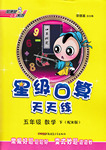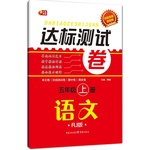题目内容
---I just can't stop worrying about the result of the job interview.
---______. There's nothing you can do now but wait.
- A.Relax
- B.Go ahead
- C.Go for it
- D.Good luck
解析:本题考查交际用语。根据上句句意“我不禁担心面试的结果”和答语“你能做的只有等待”,可知后者所说的是安慰的话,因此选择A项,“放松点,别担心”。B.Go ahead,“去吧、干吧”,用来回答别人的请求;C.Go for it,“加油”用于鼓励别人的语境;D.Good luck,“祝你好运”,用来表达祝愿。

 星级口算天天练系列答案
星级口算天天练系列答案 芒果教辅达标测试卷系列答案
芒果教辅达标测试卷系列答案Today I was at the mall waiting for friends, when a lady wearing a knit hat and a sweater came up to me and, shivering, said, “I’m homeless. Would you mind buying me some food?”
In that split second, everything I’d learned since kindergarten flashed through my mind. Don’t talk to strangers … Be a good citizen … People will take advantage of you … Treat others as you wish to be treated … The greatest thing you’ll ever learn is just to love and be loved in return … I guess love won the debate. “Sure,” I said. “What would you like?”
She thought and then said, “I’d like to get Chinese food.” We headed upstairs. On the way she told me about when she was a teenager. She remembers taking pictures for the yearbook with her best friend. She was in the band and played basketball. She got good grades and was a good student.
She ordered soup, an egg roll, white rice, and pepper chicken. I would normally think that was a lot, but she had probably barely eaten in the last few days. I got my usual – lo mein and General Tso’s chicken.
As we ate, we got to know each other. She asked if I played any instruments. I replied that I played the violin, cello, and guitar. She told me she played the flute, piano, guitar, and violin. In the middle of our meal, I realized something. And she thought of it at exactly the same time.
“So, what’s your name?” she asked.
“I’m Claire,” I said, startled at our exact same thought. “What’s yours?”
“Joyce,” she said with a smile.
We continued talking, and she asked my favorite subjects in school and if I wanted to go to college. “Hopefully,” I replied. “I’m interested in nursing.”
“I went to college for nursing,” she said.
I was taken aback. How could we have so much in common? Was she pretending so I’d feel sympathy for her? But her eyes were genuine as she said this.
Meanwhile I was eating my lo mein, picking around the cabbage and the other vegetables. Joyce said, “If you don’t like it you can take it back.” I told her that I liked it, but was not fond of the vegetables. She broke into a big grin. “You don’t like vegetables, huh? Neither did I. But now I do.” I immediately felt guilty. How could I be picking at my food across from someone who barely gets to eat at all?
I tried my best to finish, but she seemed to sense my guilt and said, “You don’t have to eat it if you don’t want it.” How could she know what I was feeling? I told her the dish was my favorite, but I just eat slowly.
She replied, “I used to like lo mein, but pepper chicken was my dad’s favorite, so I get that now.” Noticing that she used the word “was,” I assumed her dad had passed away. I found it sweet that she gave up her favorite in order to honor her dad.
She asked why I was at the mall.
“I’m waiting for friends. We’re going to see ‘The Curious Case of Benjamin Button,’” I replied, stumbling over the words a bit.
“‘The Curious Case of Benjamin Button,’” she echoed in awe. “What’s that about?” I realized that she didn’t see commercials for movies.
I explained the basic plot and she chuckled. “A man who is born 80 years old and ages backwards! That sounds interesting.”
She got up to get a to-go box. “Would you like one?” she asked, but I refused. I realized that this food would probably last her for a few days, and I was glad she had ordered a lot.
“Would you like these?” I asked, gesturing at the food I had left untouched. “Oh, no, thank you,” she said. “This is enough.” I got up to throw my tray away, feeling guilty about wasting so much.
“I need to meet my friends now,” I explained. “It was so nice to meet you, Joyce.”
“You too, Claire,” she replied with a smile. “Thank you.”
I headed to the theater, and she went back downstairs. It sounds like a perfect coincidence, but I can’t help but think that some force compelled us to meet. I kept puzzling, Why is Joyce homeless? It seems so unfair. She shouldn’t need people to buy her dinner. She was a nurse. She got good grades. She took pictures for her yearbook. She was the person I hope to be in the future. What went wrong? How could such a good life be rewarded with horrible luck?
I feel lucky to have run into Joyce. She changed my outlook. She is still a wonderful person, despite what the world has done to her. I wish her the best, and can only hope that the force that brought us together will help her find what she deserves in life.
【小题1】From the second paragraph we know that the writer _________.
| A.debated with the girl over moral issues |
| B.hates having to make a quick decision |
| C.hesitated before she decided to reach out |
| D.fell in love with the girl at the first sight |
| A.she was particular about food and also wasted so much |
| B.she was a strict vegetarian who ate very little |
| C.she didn’t order enough food for the girl |
| D.she urged the girl to take her share of food |
| A.She was a victim of high education |
| B.She actually had some kind of mental disorder |
| C.She graduated with average grades |
| D.The reason is not yet given. |
| A.They both took interest in nursing. |
| B.They were about to ask names of each other at the same time. |
| C.When Claire headed to the theater, Joyce went back downstairs. |
| D.They were both musical lovers. |
| A.she didn’t know what she was going to be until then. |
| B.this chance meeting changed her attitudes towards life in a way. |
| C.she was glad to be able to pay for someone in need. |
| D.hopefully the force that brought them together may bring good luck to Joyce. |
| A.arouse readers’ curiosity |
| B.explore social problems |
| C.teach readers a lesson |
| D.share a sweet personal story |
There is a famous story about British poet Samuel Taylor Coleridge. He was writing a poem when he was interrupted by a knock at the door.
This was an age before telephones. Someone was delivering a message. When Coleridge got back to his poem, he had lost his inspiration. His poetic mood had been broken by the knock on his door. His unfinished poem, which could otherwise have been a masterpiece, would now never be more than a fragment.
This story tells how unexpected communication can destroy an important thought, which bring us to the cellphone.
The most common complaint about cellphones is that people talk on them to the annoyance of people around them. But more damaging may be the cellphone’s interruption of our thoughts.
We have already entered a golden age of little white lies about our cellphones, and this is by and large(大体上)a healthy, protective development. “I didn’t hear it ring” or “I didn’t realize my phone had shut off” are among the lies we tell to give ourselves space where we’re beyond reach.
The notion of being unreachable is not a new concept—we have “Do Not Disturb” sign on the doors of hotel rooms. So why must we feel guilty when it comes to cellphones? Why must we apologize if we decide to shut off the phone for a while?
Now time alone, or a conversation with someone next to us which cannot be interrupted by a phone, is something to be cherished. Even cellphone devotees(信徒), myself usually included, can’t help at times wanting to throw their phone away, or curse the day they were invented.
But we don’t and won’t, and there really is no need. All that’s required to take back our private time is a general social recognition that we have the right to it. In other words, we have to develop a healthy contempt for the rings of our own phones.
A cellphone call deserves no greater priority than a random word from the person next to us,though the call on my cellphone may be the one-in-a-million from Steven Spielberg—who has finally read my novel and wants to make it his next movie. But most likely it is not, and I’m better off thinking about the idea I just had for a new story, or the slice of pizza I’ll eat for lunch.
【小题1】What is the point of the anecdote(轶事)about the poet Coleridge in the first three paragraphs?
| A.To direct readers’ attention to the main topic. |
| B.To show how important inspiration is to a poet. |
| C.To emphasize the disadvantage of not having a cellphone. |
| D.To encourage readers to read the works of this poet. |
| A.It is a way of signaling that you don’t like the caller. |
| B.It is natural to tell lies about small things |
| C.It is basically a good way to protect one’s privacy. |
| D.We should feel guilty when we can’t tell the truth. |
| A.People get so obsessed (着迷) with the cellphone rings that they fail to notice anything else. |
| B.People feel guilty when they are not able to answer their cellphones. |
| C.Cellphones interrupt people’s private time. |
| D.With cellphones it is no longer possible to be unreachable. |
| A.A person who calls us from afar deserves more of our attention. |
| B.Steven Spielberg once called the author to talk about the author’s novel. |
| C.You should always finish your lunch before you answer a call on the cellphone. |
| D.Never let cellphones disturb your life too much. |